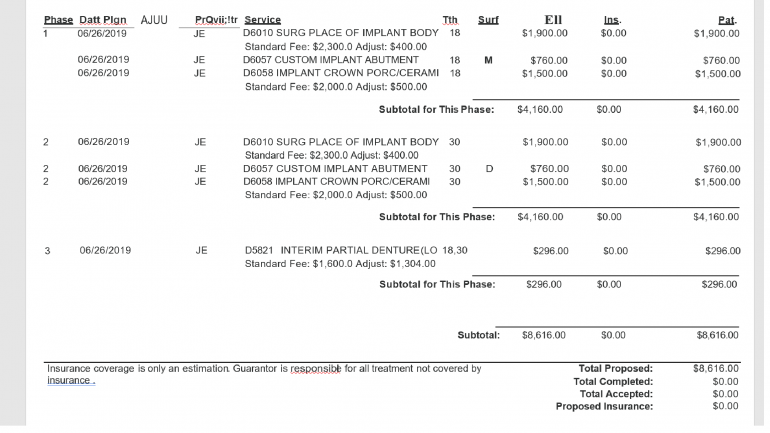
Dental Code D0180: Comprehensive periodontal evaluation - new or established patient
Dental Code D0180 refers to a comprehensive periodontal evaluation performed on both new and established patients. This code is used by dental professionals to document and bill for a thorough assessment of a patient's periodontal health. A comprehensive periodontal evaluation is an important part of dental care as it helps in the detection and management of periodontal diseases, which affect the gums and supporting structures of the teeth.
Dental Code D0180 Price Range
As with other services, prices in America vary from dentist to dentist and city to city. The minimum charge for this service is $70 and the maximum $150. Most dentists charge around $100.
Low cost of living | Medium cost of living | High cost of living |
Memphis (Tennessee), Cincinnati (Ohio) | Miami (Florida), Denver (Colorado), Austin (Texas) | (New York (New York), San Francisco (California) |
$70 | $100 | $150 |
What does the code mean?
Dental Code D0180 indicates a comprehensive evaluation of a patient's periodontal condition. It involves a detailed examination and assessment of the gums, teeth, and supporting structures to determine their overall health. This evaluation provides important information about the presence and severity of periodontal disease and helps the dental professional develop an appropriate treatment plan.
Medical and Dental History Review
The first step in a comprehensive periodontal evaluation is reviewing the patient's medical and dental history. This includes gathering information about any existing medical conditions, allergies, medications, and previous dental treatments. Understanding the patient's overall health is crucial in determining the risk factors associated with periodontal diseases.
Clinical Examination
The next step involves a comprehensive clinical examination. The dentist or dental hygienist will visually inspect the patient's oral cavity, looking for signs of inflammation, bleeding, swelling, or other abnormalities. They will also check for signs of periodontal disease, such as gum recession, pocket depths, tooth mobility, and plaque accumulation. During the clinical examination, the dental professional will also evaluate the patient's oral hygiene practices and provide guidance on proper brushing and flossing techniques. They may use special tools like a periodontal probe or a periodontal explorer to assess the health of the gums and detect any potential periodontal pockets or areas of concern. This thorough examination helps in early detection and intervention, leading to better oral health outcomes.
Periodontal Probing
Periodontal probing is an essential part of the evaluation. It involves measuring the depth of the pockets between the gums and teeth using a periodontal probe. The probe is gently inserted into the space between the tooth and the gums, and the depth of the pocket is recorded. This measurement helps determine the presence and severity of periodontal disease. Generally, pocket depths of 1-3mm are considered healthy, while depths greater than 3mm may indicate gum disease. Periodontal probing also allows the dental professional to assess the presence of bleeding upon probing, which can indicate inflammation and active disease. In addition to measuring pocket depths, the dental professional may assess the presence of calculus (tartar) deposits and evaluate the tooth surfaces for signs of tooth root exposure or sensitivity. This detailed examination helps in developing a personalized treatment plan tailored to the patient's specific needs.
Radiographic Evaluation
In addition to the clinical examination, radiographic evaluation is often performed to assess the condition of the teeth and supporting structures below the gum line. X-rays, such as bitewing or panoramic radiographs, are commonly used to identify bone loss, tooth decay, abscesses, and other hidden dental problems. These images provide a more comprehensive view of the patient's oral health and aid in accurate diagnosis and treatment planning.
Comprehensive Charting
Comprehensive periodontal evaluation also involves charting the findings obtained from the examination. This includes recording pocket depths, bleeding on probing, furcation involvement, tooth mobility, and other relevant information. Charting helps in creating a baseline record of the patient's periodontal health, making it easier to track changes over time and monitor the effectiveness of treatment. In addition to recording pocket depths, bleeding on probing, furcation involvement, and tooth mobility, comprehensive charting may also include noting the presence of plaque or calculus deposits, recession of the gums, and the condition of the tooth surfaces. This detailed charting provides a comprehensive overview of the patient's periodontal health and aids in monitoring the progress of treatment, identifying areas of improvement, and adjusting the treatment plan accordingly. It serves as a valuable reference for future evaluations and allows for better communication and collaboration among dental professionals involved in the patient's care.
Diagnosis and Treatment Planning
Based on the information gathered from the evaluation, the dentist or periodontist will establish a diagnosis and develop an appropriate treatment plan. The diagnosis may include identifying the stage and severity of gum disease, determining the presence of other dental conditions, and assessing the overall oral health of the patient. The treatment plan may involve a combination of non-surgical or surgical interventions to address the specific needs of the patient.
Summary of Dental Code D0180
Dental Code D0180 represents a comprehensive periodontal evaluation for new or established patients. This code encompasses a thorough assessment of a patient's periodontal health, including medical and dental history review, clinical examination, periodontal probing, radiographic evaluation, comprehensive charting, and diagnosis and treatment planning. The comprehensive periodontal evaluation provides valuable information about the patient's periodontal condition, helping dental professionals to identify and manage periodontal diseases effectively. By using Dental Code D0180, dental practitioners can accurately document and bill for this important evaluation, ensuring optimal oral health care for their patients.
Prioritize Your Health! Compare Prices for Periodontal Evaluation at Dr. BestPrice and secure the most affordable and comprehensive care.
